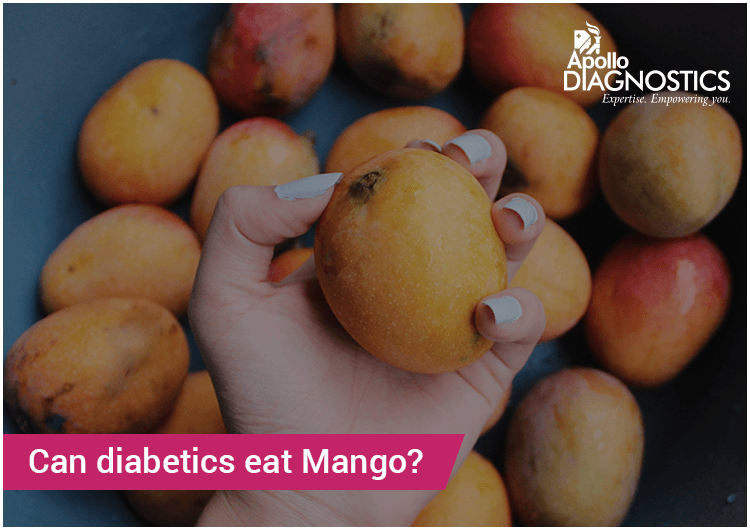Can diabetics eat mango?
Jun 04, 2020

Diabetes may present itself in different forms namely type 1 diabetes, type 2 diabetes, gestational diabetes, and prediabetes. They are distinct from one another based on the intensity of the patient’s inability to break down sugar or glucose in their bloodstream. The pancreatic hormone, insulin, is responsible for the breakdown of sugar. However, the body of a diabetic person resists insulin formation leading to an abnormal and unhealthy level of sugar in the blood.
Even though we all know that foods rich in sugar or high on calories are forbidden to diabetic patients, there are certain myths associated with the consumption of mangoes that must be eliminated. In the dietary plan for a diabetic patient, the amount of carbohydrate consumed should be checked, not removed completely. Many studies have shown that eating fruit rich in sugar is better than munching on a sweet biscuit. This is because the glycaemic index of a particular fruit is lower in comparison to other snacks.
The glycaemic index of a food is a vital indicator of the consequence the food may have on the blood glucose level. A lower index is directly proportional to a healthier blood sugar level. It is proven through various medical studies that mangoes have a lower glycaemic index as compared to many other carbohydrates that become a part of the person’s diet. Any diabetic patient, depending upon the severity of their condition, should opt for a balanced diet that includes protein, carbohydrate, leafy greens and fruits.
index as compared to many other carbohydrates that become a part of the person’s diet. Any diabetic patient, depending upon the severity of their condition, should opt for a balanced diet that includes protein, carbohydrate, leafy greens and fruits.
 index as compared to many other carbohydrates that become a part of the person’s diet. Any diabetic patient, depending upon the severity of their condition, should opt for a balanced diet that includes protein, carbohydrate, leafy greens and fruits.
index as compared to many other carbohydrates that become a part of the person’s diet. Any diabetic patient, depending upon the severity of their condition, should opt for a balanced diet that includes protein, carbohydrate, leafy greens and fruits.Moderation is the key here. So it would be incorrect to assume that consumption of mango is prohibited for patients suffering from diabetes. It is the quantity that matters. If the patient consumes in small portions and avoids any other recipe rich in carbohydrate for that day, then it is not at all harmful. The nutritional value of mango is often overlooked because of the high amount of sugar present in it. Thus, expert nutritionists recommend the intake of mangoes in small amounts.
Many studies by American Institutes have concluded that eating mangoes in moderation can assist in the breakdown of glucose and also lower insulin resistance. If other foods involving starch composition and dairy products are avoided, then no additional harm can occur by the consumption of mangoes. The patients must consult their doctor to know the exact portion of this delicious fruit that they may consume without worry.
Even cutting the fruit in small portions is helpful since it becomes easier for digestion. Some studies have indicated that about 30% of the sugar content in mango is fructose. This fruit sugar is metabolized in the liver which increases the level of triglyceride in the body. Owing to this, the intake of mangoes by diabetics becomes a matter of concern.
Many veteran doctors even recommend that mangoes should be eaten during the daytime when the body’s rate of metabolism is higher than the night-time. The debate over mangoes is widespread and diverse. Thus, all the doctors and nutritionists come to the common agreement that the consumption of mango depends upon the kind of diabetes one is suffering from. Moreover, complete restraint of any carbohydrate can also lead to an unnaturally low blood glucose level, which is again a problematic situation.
To keep your diabetes in control, it is important to monitor your health. A regular diabetes check will help you prevent many complications. For accurate and timely diagnosis, book an appointment now with Apollo Diagnostics.
Related Blog Post
Blog Categories
- Child Health
- Mens Health
- Women's Health
- Mental Health
- Health Myths & Facts
- Fitness
- Nutrition/Recipes
- Remedies
- Weight Management
- Stress Management
- Health Supplements
- Addiction Management
- Disease Management
- Allergy
- Anemia
- Arthritis
- Asthma
- Autoimmune Diseases
- Blood Pressure
- Cancer
- Deficiencies
- Dengue/Malaria/Chikungunya
- Diabetes
- Eye Problems
- Heart Diseases
- Hepatitis
- HIV/AIDS/STD
- Hormonal Imbalance
- Infection/Flu/Viral
- Kidney
- Liver
- Menstrual Problems
- Pregnancy
- Skin & Hair Problems
- Stomach Ailments
- Thyroid
- Others
- Health Checkups
- Diagnostics/Pathology
- Lifestyle & Wellness
- Covid
- Medical Tests
- Cholesterol
- Health Tips
- Parent Care/Old Age
- Lungs
- Food Intolerance








